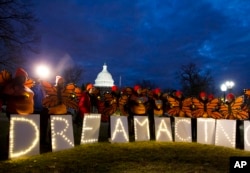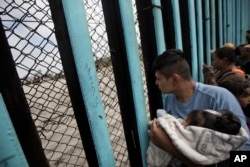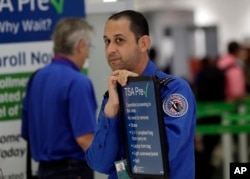Republicans in the U.S. Senate have released a spending proposal that would end the partial government shutdown, taking direction from a proposal by President Donald Trump that he called a “compromise plan” but which Democrats say will go nowhere.
The most politically important piece is $5.7 billion in funding to build a barrier along the U.S.-Mexico border, something Trump has said since he campaigned for president is necessary to stop illegal immigration and the flow of drugs across the border.
Democrats counter that a wall is an expensive and ineffective way to achieve those goals, and instead have proposed spending $1.3 billion on other measures such as adding more immigration judges and screening technology at border crossings. The Democrat-led House of Representatives has passed several bills with those elements and plans more votes this week.
McConnell plans a vote
Senate Majority Leader Mitch McConnell plans to hold a vote on the Republican proposal this week as well. It is unlikely to take place Tuesday.
In exchange for Trump’s demand for border wall funding, the proposal includes pieces meant to entice Democratic support. It would give three years of protection for young immigrants who came to the country illegally when they were children and who are enrolled under an Obama-era program known as Deferred Action for Childhood Arrivals (DACA).
The same extension would apply to temporary protected status (TPS) for people who fled Latin American and African countries because of violence or natural disasters. Trump has previously sought to end DACA and to halt TPS for people from certain countries.
The Republican plan would add 750 border patrol agents and 375 customs officers, as well as technology upgrades at ports of entry.
It would boost funding for immigration enforcement, including adding 2,000 law enforcement, support and legal personnel, and thousands of vehicles.
Stricter asylum rules
Rules for children from El Salvador, Guatemala and Honduras seeking asylum would become stricter. The proposal calls for those minors to apply for asylum at one of several processing centers to be set up in Central America.
Republicans say the changes would reduce the incentives for people to make the dangerous trip to seek asylum at the U.S. border.
Funding to the governments in El Salvador, Guatemala and Honduras would also be tied to requirements for each to tell its citizens about the dangers of making the trek to the United States, to combat human trafficking and drug trafficking, to cooperate with U.S. efforts to repatriate migrants who are not eligible for asylum, and to support education and anti-poverty programs.
Democrats have insisted Trump and the Republicans reopen the government first before discussing border security policy, and so far they have not shown any sign of supporting the Senate proposal.
Democrats' support needed
With Republicans holding a 53-47 majority in the Senate, they would need a number of Democrats to support the bill in order to reach the 60-vote threshold usually required for legislation to advance.
The partial government shutdown has been in effect since Dec. 22, and from the rhetoric of Republican and Democratic leaders it does not appear to be on the verge of a resolution.
“Democrats are kidding themselves (they don’t really believe it!) if they say you can stop Crime, Drugs, Human Trafficking and Caravans without a Wall or Steel Barrier,” Trump tweeted Monday. “Stop playing games and give America the Security it deserves.”
“Nothing has changed with the latest Republican offer,” said Justin Goodman, spokesman for Senate Minority Leader Chuck Schumer. “President Trump and Senate Republicans are still saying: ‘Support my plan or the government stays shut.’ That isn’t a compromise or a negotiation — it’s simply more hostage taking.”
About 800,000 federal workers have been affected by the shutdown, with more than half ordered to continue working without pay and the rest sent home. Many are set to miss their second paycheck Friday.








